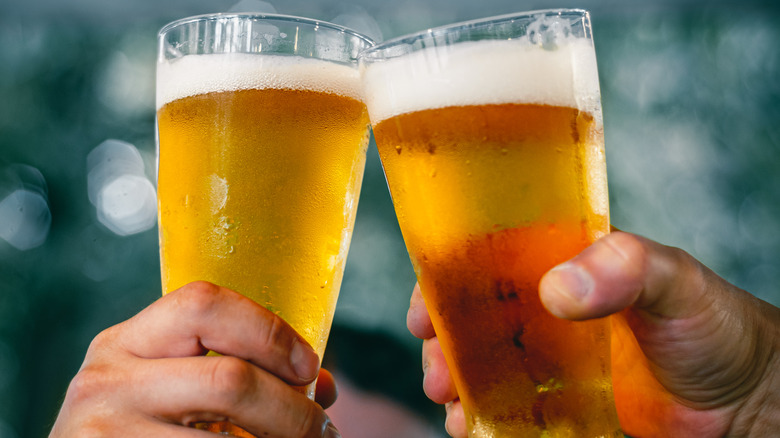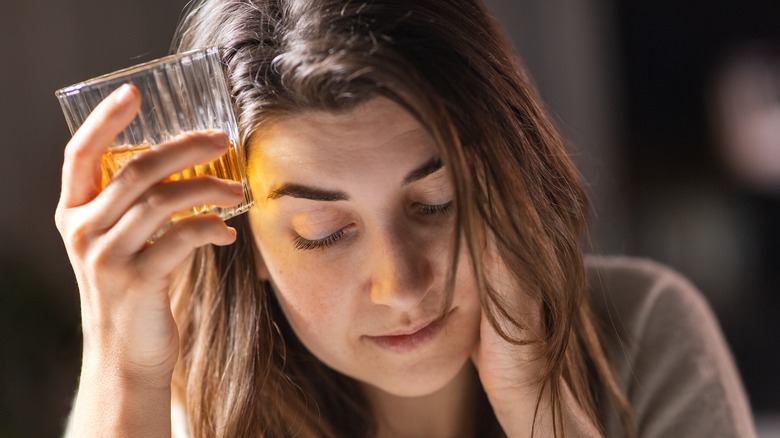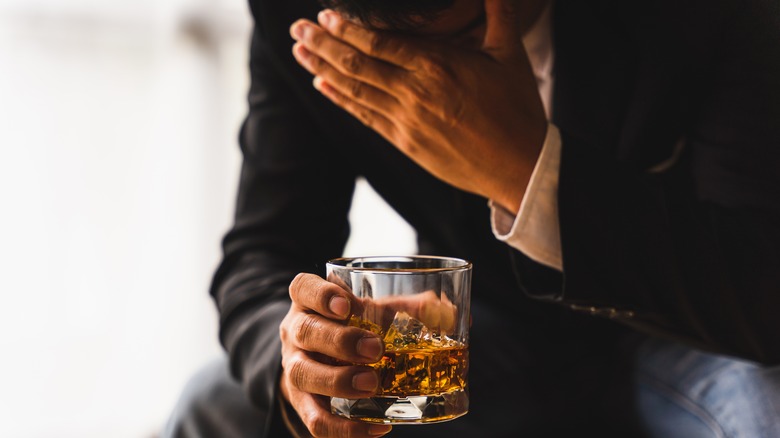Is It Safe To Drink Alcohol On Lexapro?
For people suffering from depression and anxiety, Lexapro, or escitalopram, can be an effective treatment. Part of a class of drugs known as selective serotonin reuptake inhibitors, Lexapro helps to balance out serotonin levels in the brain, per WebMD. Serotonin is a chemical in the brain that aids in learning, memory, and happiness, among other functions, notes the Cleveland Clinic. It is thought that lower serotonin levels may impact patients who suffer from depression and anxiety.
Lexapro has proven to be a powerful weapon against depression, as evidenced by a 2018 study published in Neuropsychiatric Disease and Treatment. According to that study, more than 60% of patients treated with Lexapro showed remission in their depression symptoms. However, people taking Lexapro often have concerns about possible drug interactions and side effects. For example, breastfeeding women should weigh the potential benefits of taking Lexapro against the possible drawbacks, as the drug can make its way into breast milk (via MedicineNet). Given the possible interactions and side effects brought on by Lexapro, people considering using the drug want to know what the effects are of mixing Lexapro and alcohol.
Alcohol can make depression worse
The U.S. Food and Drug Administration (FDA) has noted that the jury is still out as to whether or Lexapro's effects are exacerbated by alcohol use, but also made a point to say that combining the two is not recommended. This is primarily because alcohol is a depressant, affecting the central nervous system, and could potentially interfere with Lexapro and prevent it from working the way that it should. Alcohol use can act against the positive effects of Lexapro, worsening the symptoms of the very condition that Lexapro is attempting to manage (via Mayo Clinic). Over time, combining your medication with alcohol may only serve to make your anxiety and depression worse and make it much harder for the condition to be properly treated.
In addition, alcohol and Lexapro can interact in such a way that the unpleasant effects of alcohol, such as drowsiness, agitation, and impaired motor control, can be worsened.
Alcohol use can increase with depression and anxiety
Some people may think that they can temporarily go off of Lexapro so that they can drink. However, given the fact that the effectiveness of the drug is based on daily doses, this is not a recommended course of action, per Medical News Today. If you suddenly stop taking your medication, it can lead to withdrawal. You may experience nausea, headaches, irritability, and nightmares as your body goes through the withdrawal process
Additionally, people who suffer from depression and anxiety may turn to alcohol as a means of managing their condition, per Silver Maple Recovery. However, alcohol can impact the effects of Lexapro, leading to people drinking more as a means of coping with their emotions. Unfortunately, this can lead to drinking even more excessively, which, over time can cause liver damage and other health problems. People who suffer from depression are twice as likely to develop problems with alcohol in their lives. Because of this risk, as well as the other problems that can arise from mixing alcohol and Lexapro, it is a good idea to talk to your doctor and follow his or her advice when it comes to mixing the two.
If you or someone you know needs help with mental health or addiction issues, please contact the Crisis Text Line by texting HOME to 741741, call the National Alliance on Mental Illness helpline at 1-800-950-NAMI (6264), visit the National Institute of Mental Health website, visit the Substance Abuse and Mental Health Services Administration website, or contact SAMHSA's National Helpline at 1-800-662-HELP (4357).



